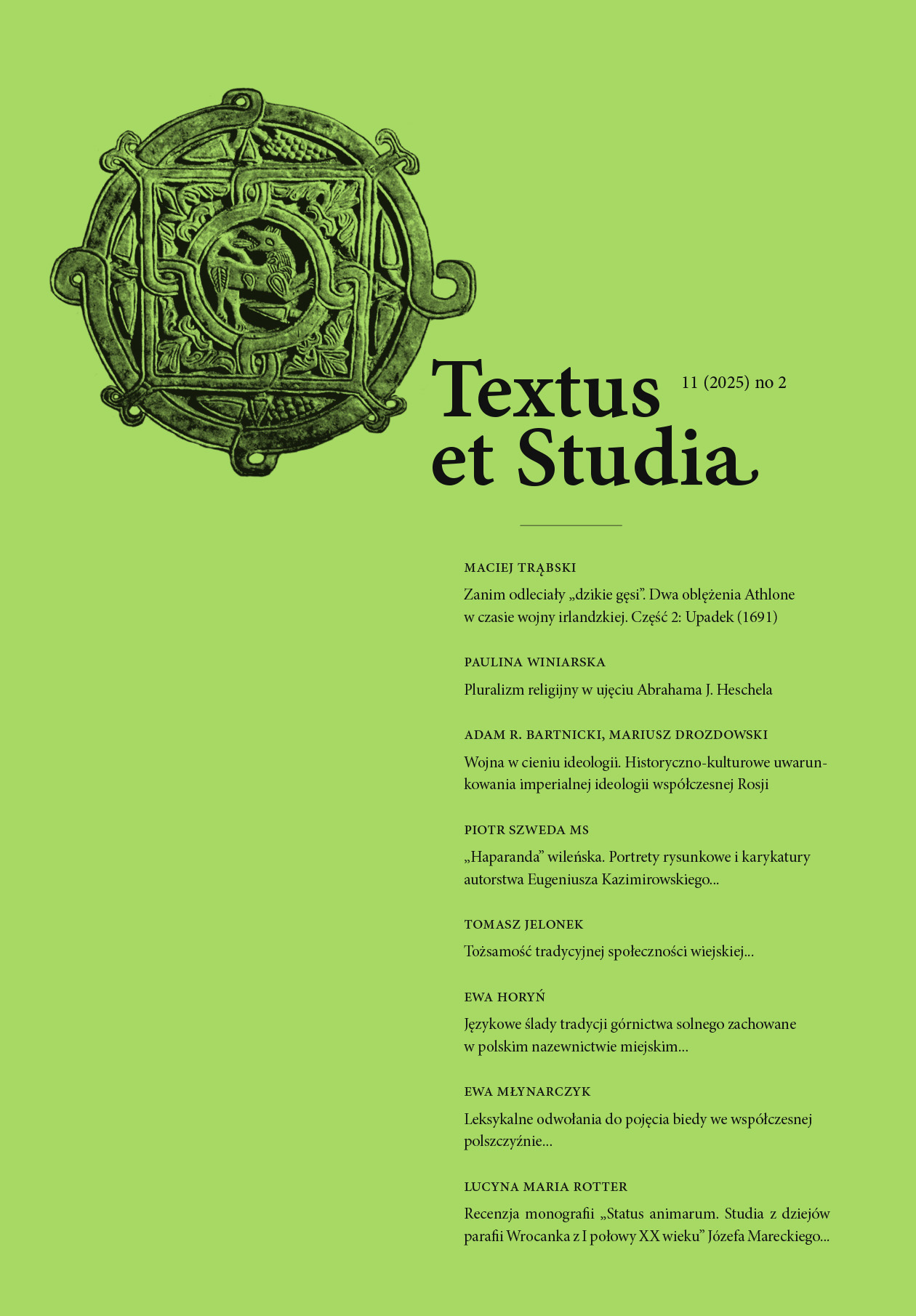Religious pluralism as seen by Abraham J. Heschel
DOI:
https://doi.org/10.15633/tes.11202Keywords:
religious pluralism, dialogue, interreligious dialogue, Abraham J. Heschel, philosophy of religion, Jewish philosophy, interreligious communication, religion, faith, God, dignity, manAbstract
Religious pluralism is a social fact. When we use the term pluralism in a religious context, we mean the acceptance of diverse beliefs regarding faith in God and salvation in different cultures, thus, we enter the path of dialogue and interreligious dialogue. Interreligious dialogue is a constant challenge, so it is necessary to look for new solutions or concepts that will make it fruitful. Religious pluralism is a prerequisite for interreligious dialogue — a thesis that resounds from the thought of Jewish philosopher Abraham J. Heschel, and seems extremely apt. The author also points to other terms he juxtaposes with this notion, namely: faith, capacity for reflection, openness or bonding. He presented them in the area of axiological values, such as love, justice and human dignity. The purpose of this article is to analyze the term religious pluralism in Heschel’s terms and relate it to interreligious dialogue. In the Polish scholarly discourse, there is a growing interest in his thought, however, there are no publications that deal with the subject matter covered. This article uses the method of hermeneutic analysis of the literature of the subject and object, which is both a primary source and a broad commentary on the issues presented.
References
Benjamin M. H., The obligated self: maternal subjectivity and Jewish thought, Indiana 2018, https://doi.org/10.2307/j.ctv2bctgs.
Eliade M., Próba labiryntu. Rozmowy z Claude-Henri Rocquetem, Warszawa 1992.
Even-Chen A., Meir E., Between Heschel and Buber: a comparative study, Boston 2012.
Fernando A., Z perspektywy Azji. Nowość poglądów Heschela na dialog międzyreligijny, w: Żadna religia nie jest samotną wyspą. Abraham Joshua Heschel i dialog międzyreligijny, red. H. Kasimow, B. L. Sherwin, Kraków 2005, s. 205–214.
Grosfeld J., Stosunek do Żydów i judaizmu jako warunek drogi jedności chrześcijan, w: O co chodzi w ekumenizmie? Czym jest dialog? Podstawowe idee Vaticanum II pół wieku później, red. M. Kita, Kraków 2015, s. 131–155.
Held Sh., Abraham Joshua Heschel: the call of transcendence, Indiana 2013.
Heschel A. J., Die Prophetie. O istocie proroctwa, Kraków 1936.
Heschel A. J., Kim jest człowiek?, przeł. K. Wojtkowska, Łódź 2018.
Heschel A. J., Prorocy, przeł. A. Gorzkowski, Kraków 2021.
Heschel A. J., Żadna religia nie jest samotną wyspą, w: Żadna religia nie jest samotną wyspą. Abraham Joshua Heschel i dialog międzyreligijny, red. H. Kasimow, B. L. Sherwin, Kraków 2005, s. 29–50.
Kasimow H., Heschela prorocza wizja pluralizmu religijnego, w: Żadna religia nie jest samotną wyspą. Abraham Joshua Heschel i dialog międzyreligijny, red. H. Kasimow, B. L. Sherwin, Kraków 2005, s. 107–124.
Kluczyński A. P., O istocie proroctwa (1936) Abrahama Heschela na tle ówczesnego stanu badań nad biblijnym profetyzmem, w: Żydzi wschodniej Polski, seria 2: W blasku i w cieniu historii, red. J. Ławski, B. Olech, Białystok 2014, s. 356–364.
Kondrat K., Racjonalność i konflikt wierzeń religijnych, Wrocław 2002.
Merkle J. C., Heschel wobec pluralizmu religijnego, w: Żadna religia nie jest samotną wyspą. Abraham Joshua Heschel i dialog międzyreligijny, red. H. Kasimow, B. L. Sherwin, Kraków 2005, s. 125–138.
Mróz M., Tolerancja, w: Leksykon socjologii religii, red. M. Libiszkowa-Żółtkowska, J. Mariański, Warszawa 2004.
Musiał S., Czarne jest czarne, w: S. Musiał, Wyrzut sumienia. Wokół relacji chrześcijańsko-żydowskich i polsko-żydowskich, Kraków 2019, s. 100–118.
Panikkar R., Religie świata w dialogu, tłum. J. Marzęcki, Warszawa 1986.
Pascal B., Rozprawy i myśli, Warszawa 1962.
Pasek Z., Przybył-Sadowska E., Słownik religii, Kraków 2010.
Sherwin B. L., Mój Mistrz, w: Żadna religia nie jest samotną wyspą. Abraham Joshua Heschel i dialog międzyreligijny, red. H. Kasimow, B. L. Sherwin, Kraków 2005, s. 69–90.
Szulakiewicz M., Kategoria dialogu w perspektywie filozoficznej, „Paedagogia Christiana” 25 (2010) nr 1, s. 33–53, https://doi.org/10.12775/PCh.2010.002.
Święcicki J. A., Historya literatury powszechnej, t.7, cz. 1: Literatura żydowska, Warszawa 1903.
Ziemiński I., O (nie) możliwości dialogu między religiami, „Ethos” 29 (2016) nr 1, s. 243–258.
Downloads
Published
Issue
Section
License
Copyright (c) 2025 Paulina Winiarska

This work is licensed under a Creative Commons Attribution 4.0 International License.
Authors who publish with this journal agree to the following terms:
- Authors retain the copyright and full publishing rights without restrictions, and grant the journal right of first publication with the work simultaneously licensed under a Creative Commons Attribution 4.0 International License that allows others to share the work with an acknowledgement of the work's authorship and initial publication in this journal.
- Authors are able to enter into separate, additional contractual arrangements for the non-exclusive distribution of the journal's published version of the work (e.g., post it to an institutional repository or publish it in a book), with an acknowledgement of its initial publication in this journal.
- Authors are permitted and encouraged to post their work online (e.g., in institutional repositories or on their website) prior to and during the submission process, as it can lead to productive exchanges, as well as earlier and greater citation of published work (See The Effect of Open Access).

